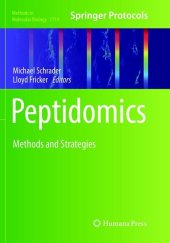 Neuerscheinungen 2019Stand: 2020-02-01 |
Schnellsuche
ISBN/Stichwort/Autor
|
Herderstraße 10
10625 Berlin
Tel.: 030 315 714 16
Fax 030 315 714 14
info@buchspektrum.de |

Lloyd Fricker, Michael Schrader
(Beteiligte)
Peptidomics
Methods and Strategies
Herausgegeben von Schrader, Michael; Fricker, Lloyd
Softcover reprint of the original 1st ed. 2018. 2019. xvii, 423 S. 62 SW-Abb., 17 Farbabb., 56 Farbtabe
Verlag/Jahr: SPRINGER, BERLIN; SPRINGER NEW YORK; HUMANA PRESS 2019
ISBN: 1-493-98514-0 (1493985140)
Neue ISBN: 978-1-493-98514-2 (9781493985142)
Preis und Lieferzeit: Bitte klicken
This volume describes protocols for basic state-of-the-art approaches in the field of peptidomics. Most of these approaches are independent of the instruments used for analysis and can easily be adapted for equipment that is available in a typical proteomics facility. Chapters detail many of the basic techniques used to detect and identify peptides, methods for the relative quantitation of peptides between samples using isotopic labels or label-free approaches, and biological species as well as sample types. Written in the highly successful format of the Methods in Molecular Biology series, each chapter includes an introduction to the topic, a list of the necessary materials and reagents, reproducible step-by-step laboratory protocols, and tips on troubleshooting common problems and avoiding pitfalls.
Authoritative and practical, Peptidomics: Methods and Strategies provides useful guidance for studies in the rapidly growing field of peptidomics.
Part I: Overview and Basic Techniques
1. Origins, Technological Development and Applications of Peptidomics
Michael Schrader
2. Brain Tissue Sample Stabilization and Extraction Strategies for Neuropeptidomics
Elva Fridjonsdottir, Anna Nilsson, Henrik Wadensten, and Per E. Andrén
3. Isolation of Endogenous Peptides from Cultured Cell Conditioned Media for Mass Spectrometry
Kazuki Sasaki
4. Mass Spectrometric Identification of Endogenous Peptides
Mikel Azkargorta, Iraide Escobes, Ibon Iloro, and Felix Elortza
5. Bioinformatics for Prohormone and Neuropeptide Discovery
Bruce R. Southey, Elena V. Romanova, Sandra L. Rodriguez-Zas, and Jonathan V. Sweedler
6. Substrate Capture Assay using Inactive Oligopeptidases to Identify Novel Peptides
Vanessa Rioli and Emer S. Ferro
7. Non-targeted Identification of d-amino Acid-containing Peptides through Enzymatic Screening, Chiral Amino Acid Analysis and LC-MS
Hua-Chia Tai, James W. Checco, and Jonathan V. Sweedler
Part II: Quantitative Methods in Peptidomics
8. Quantitative Peptidomics: General Considerations
Lloyd D. Fricker
9. Quantitative Peptidomics with Isotopic and Isobaric Tags
Kurt Boonen, Wouter De Haes, Joris Van Houtven, Rik Verdonck, Geert Baggerman, Dirk Valkenborg, and Liliane Schoofs
10. Quantitative Peptidomics using Reductive Methylation of Amines
Sayani Dasgupta, Leandro M. Castro, Alexandre K. Tashima, and Lloyd D. Fricker
11. Metabolic Labeling to Quantify Drosophila neuropeptides and Peptide Hormones
Thomas Otto Kunz, Jiangtian Chen, Megha, and Christian Wegener
12. Data Preprocessing, Visualization and Statistical Analyses of Non-targeted Peptidomics Data from MALDI-MS
Harald Tammen and Rüdiger Hess
Part III: Diverse Applied Protocols and Outlook
13. Affinity Purification of Neuropeptide Precursors from Mice Lacking Carboxypeptidase E Activity
Lloyd D. Fricker
14. Mass Spectrometry Based Immunopeptidomics for the Discovery of Cancer Neo-antigens
Michal Bassani-Sternberg
15. Milk Peptidomics to Identify Functional Peptides and for Quality Control of Dairy Products
David Dallas and S›ren Drud Nielsen
16. Neuropeptidomic Analysis of Zebrafish Brain
Kristien A. Van Camp, Geert Baggerman, Ronny Blust,and Steven J. Husson
17. Identification, Quantitation, and Imaging of the Crustacean Peptidome
Kellen DeLaney, Amanda Buchberger, and Lingjun Li
18. Identification of Endogenous Neuropeptides in the Nematode C. elegans using Mass Spectrometry
Sven Van Bael, Samantha L. Edwards, Steven J. Husson, and Liesbet Temmerman
19. EndoProteoFASP as a Tool to Unveil the Peptidome-protease Profile: Application to Salivary Diagnostics
Fábio Trindade, Inês FalcÆo-Pires, Adelino Leite-Moreira, Pedro S. Gomes, Julie Klein, Rita Ferreira, and Rui Vitorino
20. Methodology for Urine Peptidome Analysis Based on Nano-HPLC coupled to Fourier Transform Ion Cyclotron Resonance Mass Spectrometry
Alexey S. Kononikhin, Anna E. Bugrova, Natalia L. Starodubtseva, Victoria A. Sergeeva, Maria I. Indeykina, Vitaliy V. Chagovets, Igor A. Popov, Vladimir E. Frankevich, Gennady T. Sukhikh, and Eugene N Nikolaev
21. Identification of Components in Frog Skin Secretions with Therapeutic Potential as Anti-diabetic Agents
J. Michael Conlon, R. Charlotte Moffett, Jérôme Leprince, and Peter R. Flatt
22. High-Accuracy Mass Spectrometry Based Screening Method for the Discovery of Cysteine Containing Peptides in Animal Venoms and Toxins
Luuk N. van Oosten, Martijn W.H. Pinkse, Mervin Pieterse , Pierre Escoubas, and Peter D.E.M. Verhaert
23. Analysis of the Snake Venom Peptidome
Solange M. T. Serrano, André Zelanis, Eduardo S. Kitano, and Alexandre K. Tashima
24. Identification of Peptides in Spider Venom Using Mass Spectrometry
Rafael L. Lomazi, Erika S. Nishiduka, Pedro I. Silva Jr, and Alexandre K. Tashima
25. Single Cell Peptidomics: Approach for Peptide Identi


